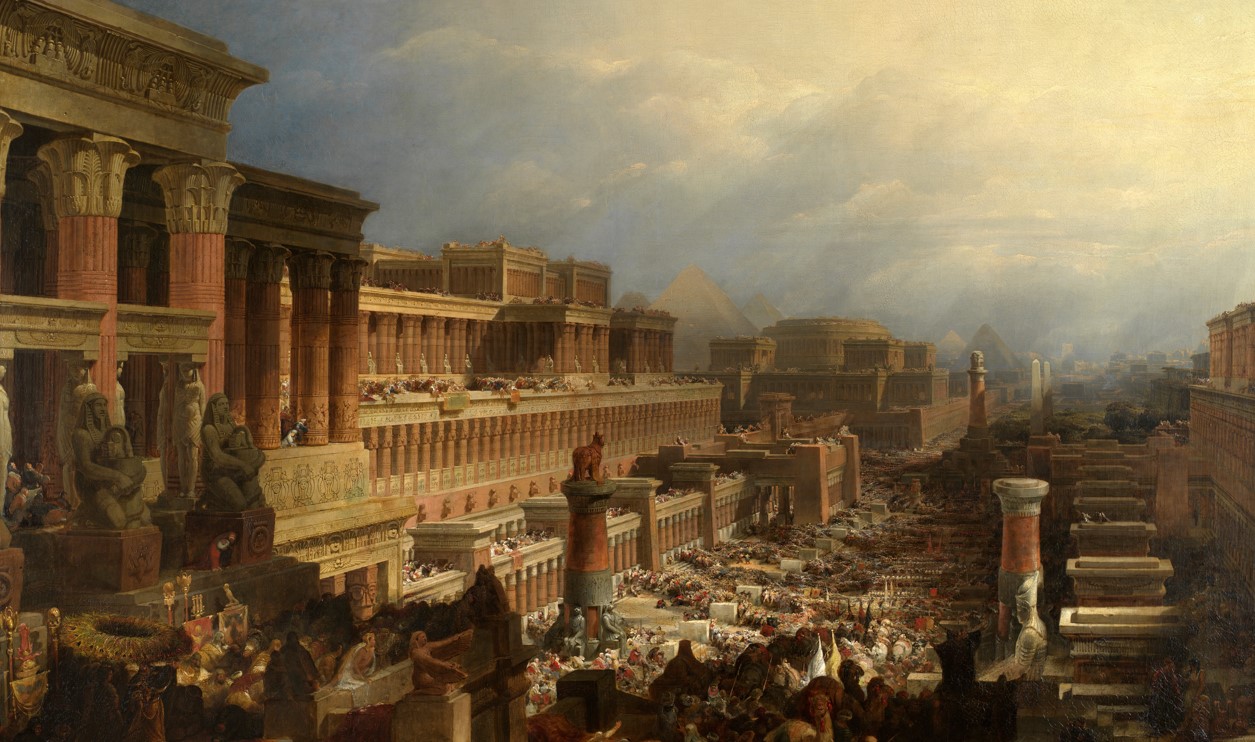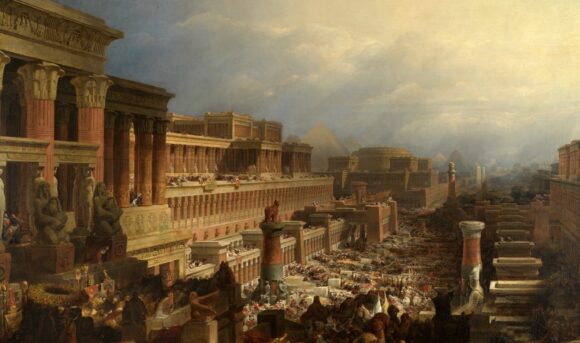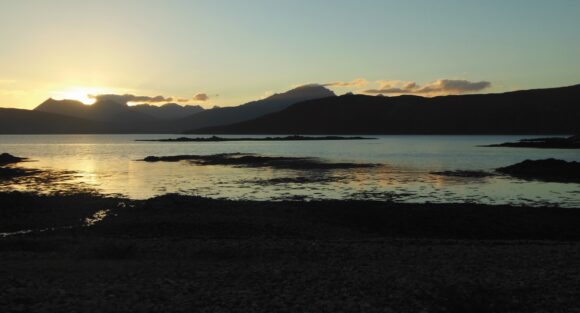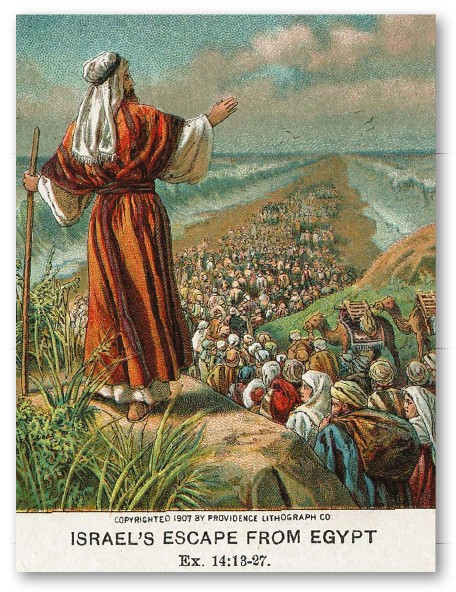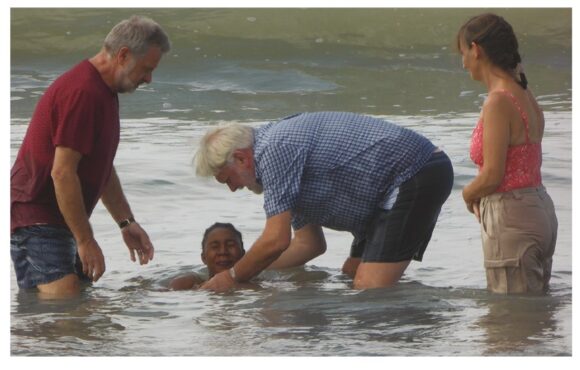IMAGINE THE ATMOSPHERE at school on the last day of the summer term. There is a special air of bubbling excitement as the books are closed for the last time and the sweet freedom of the holiday beckons.
Imagine, then, the feelings of the people of Israel, as Moses led them out of Egypt. All their lives they had slaved under the unremitting burdens of the Egyptians, with not even a break at weekends to make Iife bearable. To escape from that miserable bondage was Iiving out a dream. Moreover, Moses promised them that before long they would cross the desert and take over a prosperous land, ‘flowing with milk and honey’ (Exodus 3:8), where each of them would have their own smallholding and work for themselves. It really was too good to be true. The laughter, dancing, and happiness were a totally new experience for God’s suffering people. On that first memorable night they camped out under the stars at a place they named Succoth. The great holiday had begun. ‘Succoth’ means ‘shelters’ or ‘booths’. Even today, thousands of years afterwards, Jews build shelters of branches outside their houses once a year and sleep out in the open to commemorate those days in the wilderness. The festival is still called Succoth, after the booths that formed their temporary homes.
In passing, the writer of Exodus singles out a strange but moving sight that impressed him as that great company marched out of the land where they had lived for hundreds of years. He noticed an ancient coffin, carried along in the crowd. Decades before, Joseph, the great Jewish Prime Minister of Egypt, had asked a deathbed favour from his weeping relatives. ‘“God will visit you and bring you up out of this land to the land that he swore to Abraham, to Isaac, and to Jacob”’, he said. ‘Then Joseph made the sons of Israel swear, saying, “God will surely visit you, and you shall carry up my bones from here”’ (Genesis 50:24–25). When the time came, they remembered their promise. Joseph’s dying faith was vindicated. God had visited His people, and Joseph’s descendants carried his remains with them as they pressed eastwards, leaving the land of bondage behind.
Terror at the Red Sea
On the third day, everything started to go wrong. Instead of turning north up the sea coast along the main traders’ route to Canaan, Moses swung inland, and pitched camp near the Red Sea. The place where they stopped cannot be identified precisely, but the position was such that they had a broad stretch of water in front of them, and high ground to one side, so that they lay trapped on a wedge of land between the two (Exodus 14:9). By the third day, Pharaoh and his people were beginning to tire of having to do the chores without their Hebrew slaves. ‘What is this we have done’, they said, ‘that we have let Israel go from serving us?’ (Exodus 14:5). Pharaoh decided to fetch them back. He got ready his war chariot, assembled 600 charioteers together with a strong force of footmen and cavalry, and set off in pursuit. Reaching the encampment late in the afternoon, he decided to wait until the morning to fight. He knew the Hebrews were trapped in front of him like sheep in a fold. For their part, Moses’ people were terrified. Unarmed, strangers to war, encumbered by their families and belongings, they had no chance in a battle with Pharaoh’s hand-picked warriors. With the sea and the mountain hemming them in, they could not even run away. Bitterly they cursed Moses for his terrible blunder. ‘Is it because there are no graves in Egypt that you have taken us away to die in the wilderness? What have you done to us,’ they cried, ‘in bringing us out of Egypt?’ (v. 11).
Moses in turn called upon God, desperate for help and advice. The answer he received was a classic one. It rings through the centuries to bring comfort and hope to all who really love God, and who find themselves with no human resources left. ‘Fear not, stand firm, and see the salvation of the Lord’ (v. 13). Following His instructions, Moses stretched out his legendary rod over the sea, and then retired to rest in his tent. That night a fierce east wind blew up, beating back the water of the Red Sea. By morning, the waters seemed to have turned solid. ‘The deeps congealed in the heart of the sea’ says Exodus 15:8. This exposed a channel across to the other side. This strange and awe-inspiring sight stunned the shivering Israelites as they crawled from their tents at dawn. Recovering, they hastily grabbed their belongings and followed their bold leader to the safety of the opposite shore.
As soon as Pharaoh’s scouts reported that the Israelites had escaped, he sent in his officers after them. But their chariot wheels slithered and stuck fast in the salty mire. When Moses stretched out his rod from the other side, the waters collapsed over Pharaoh’s mighty host, drowning men and horses in a maelstrom of foam. ‘Thus the Lord saved Israel that day from the hand of the Egyptians’, wrote the chronicler, ‘and Israel saw the Egyptians dead upon the seashore’ (Exodus 14:30).
The dramatic deliverance of the Israelites from their enemies reverberated round the Egyptian empire. Forty years later, when Joshua sent spies ahead to Canaan to help plan his conquest, the woman of Jericho they interviewed reported ‘we have heard how the Lord dried up the water of the Red Sea before you’ (Joshua 2:10). The news of that deliverance was still keen in people’s memory. It became a part of Israelite history, like the Battle of Waterloo to an Englishman. There are at least six references to it in the Psalms, five in the book of Isaiah, and others in Nehemiah, Micah, and Zechariah. It is also mentioned four times in the New Testament.
Deliverance From Sin
Two passages stand out, with a surprising twist to them, and worth our curiosity. One is in Paul’s first letter to the Corinthians, where he says: ‘Our fathers were all under the cloud, and all passed through the sea, and all were baptized into Moses in the cloud and in the sea’ (1 Corinthians 10:1–2). The other reference is in Micah chapter 7, a prophetic passage but with its basis in the past: ‘He will again have compassion on us; he will tread our iniquities underfoot. You will cast all our sins into the depths of the sea’ (Micah 7:19).
You might have thought that baptism was a New Testament concept, reserved for Christians. How then were the Israelites baptised into Moses in the Red Sea? The second reference gives us a clue. The Israelites, says Micah, left their sins behind in the Red Sea. That is very much a part of Christian baptism. For example, when the men of Jerusalem repented at the apostle Peter’s preaching, and asked him what they should do, he told them ‘Repent and be baptized every one of you in the name of Jesus Christ for the forgiveness of your sins’ (Acts 2:38). ‘Rise and be baptized’, Saul of Tarsus was likewise commanded, ‘and wash away your sins’ (Acts 22:16). These writers seem to be saying that the crossing of the Red Sea was not just an eleventh-hour rescue. It had a deeper symbolic meaning as well. It marked a point of departure from the evil and darkness of their old lives in Egypt, and a new beginning as the people of God.
When Moses first came to deliver the Israelites, they worshiped idols (Acts 7:43). Their faith was dead. By his preaching, and the wonders he worked, they began to believe in God. They yearned to be set free from their slavery, and Moses prepared the way —through the blood of the Passover Iamb, and the path through the sea. The parallel with Christian baptism is perfect. As would-be disciples, we come to realise our slavery to sin, and we desire to be released. Jesus, the Lamb of God, offered his own blood for our redemption. We must believe in him, and break with our old Iife in the water of baptism, washing away our sins. Baptism is the answer of faith. The decision takes courage, as it did for the Israelites when they set off through those towering walls of water. They put their Iives in God’s hands, as we do with our future when we decide to go through with that vital immersion. ‘By faith the people crossed the Red Sea’ (Hebrews 11:29). But once on the other side, like the Israelites, we can sing and dance for joy. Our slavery has ended. In Jesus’ stirring words, ‘Everyone who commits sin is a slave to sin… So if the Son sets you free, you will be free indeed’ (John 8:34–36).
David M Pearce


